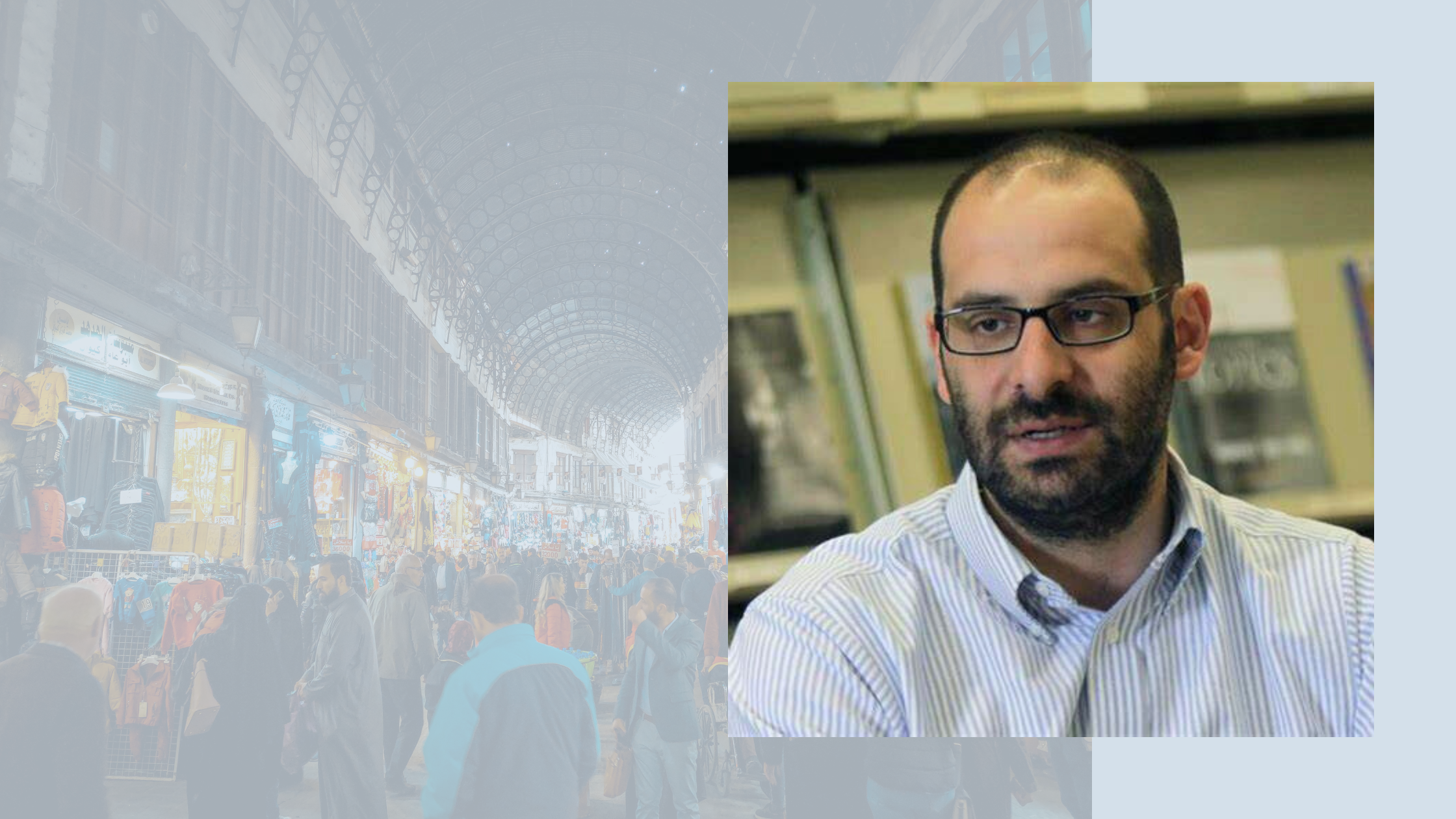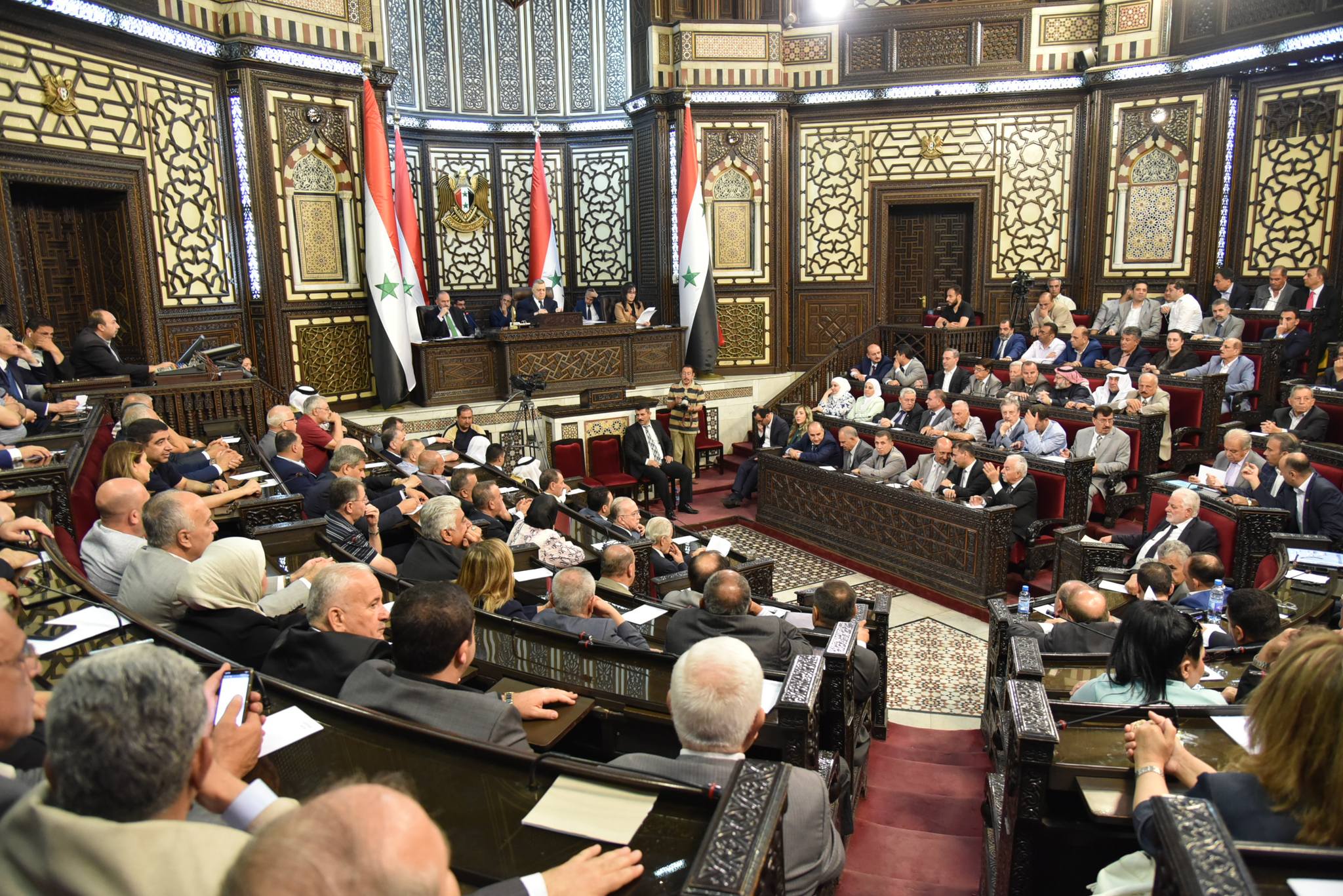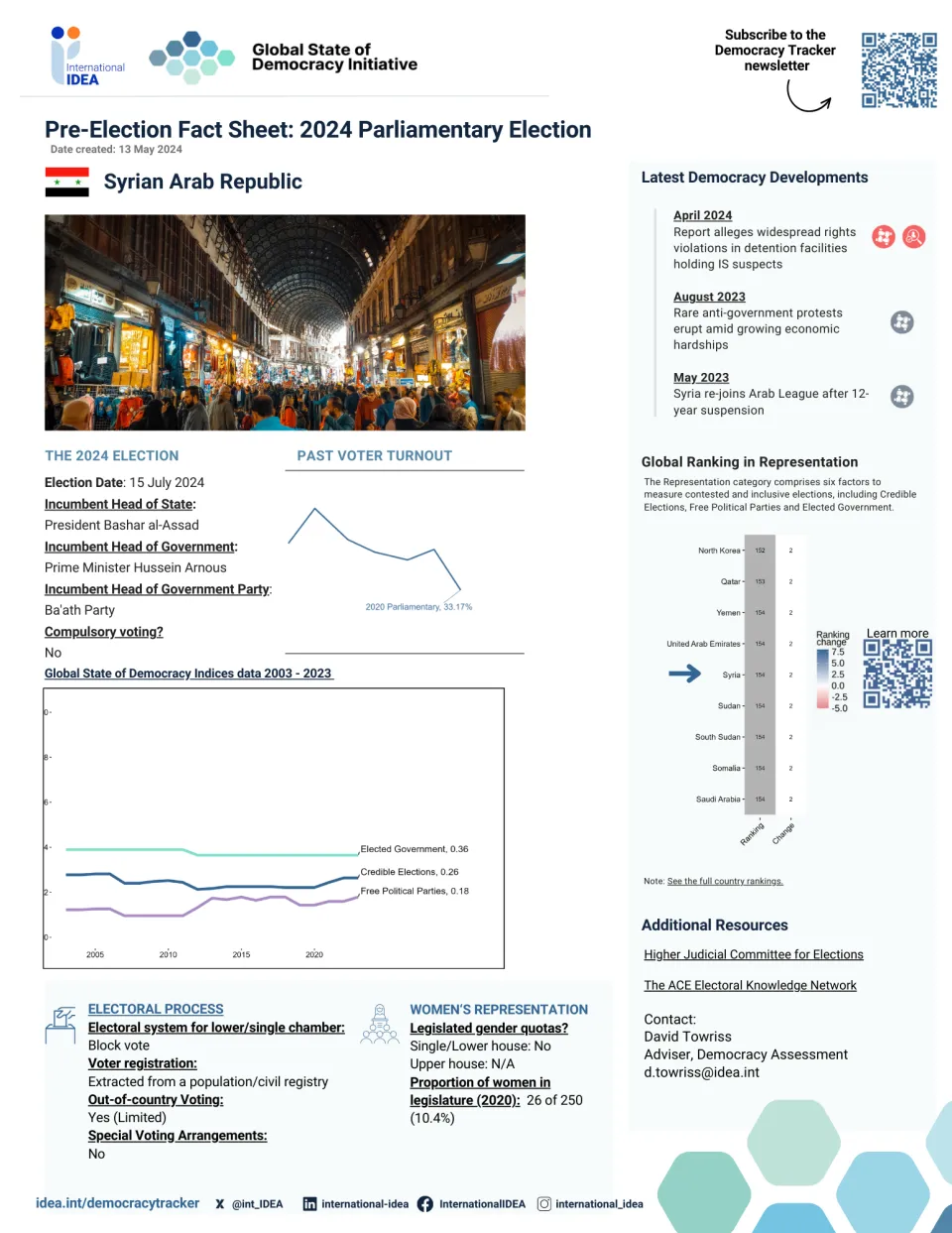
Syrian Arab Republic
The Syrian Arab Republic exhibits low-range performance across all four categories of the Global State of Democracy (GSoD) conceptual framework. It falls among the world’s bottom 25 per cent of countries with regard to most factors. Compared to five years ago, it has experienced advances in Rule of Law, albeit from very low starting levels, as well as declines in Economic Equality. The country’s recent history has been marked by a civil war that began in the wake of the 2011 Arab Spring uprisings. The government’s violent suppression of those protests led to a civil war that has since ravaged the country. With GDP cut in half and access to main oil fields lost, the captagon trade worth an estimated $5 billion annually, has become a crucial economic lifeline for the regime. Some local businesses and informal markets endure the turmoil.
The GSoD Indices data only reflect events inside government-controlled territory.
Syria gained independence in 1946 after 26 years of French control. The country is home to a diverse population, with Sunni Muslims comprising the large majority, followed by Alawi Muslims, and Druze, Ismaili and Christian communities. Post-independence Syria saw recurrent coups, culminating in the 1963 coup by the socialist and Arab nationalist Baath Party. Baathist rule was consolidated in 1970 through Hafez al-Assad’s ‘Corrective Movement’ which relied heavily on the minority Alawi community to fill government positions, creating a system of patronage and politicizing sectarian divisions between Alawi and Sunni Muslims. The regime also involved Syria in the Arab-Israeli conflict and Lebanon's civil war to strengthen regional influence. President Bashar Al-Assad assumed power in 2000 after his father’s death, inheriting a legacy of centralization, sectarian co-optation, and violent crackdown of dissent.
The Syrian civil war, which erupted in 2011 with protests against President Assad, swiftly escalated into a multifaceted conflict involving multiple actors. Key fronts of the war have included the battle against the Islamic State, which was largely defeated by an international coalition and US-backed Kurdish forces in 2018. These Kurdish forces seized the remaining IS territory in 2019, leading the Syrian Democratic Forces (SDF) to maintain autonomy in those areas, although this has resulted in an uneasy détente with the regime. Additionally, there are ongoing government-opposition clashes and Turkish offensives against Kurdish forces.
The war has created the world’s largest refugee population with around 13 million people displaced. Syrian territory is now de facto partitioned. The Assad government, supported by Russia, controls approximately 70 per cent of the country but it continues to battle a coalition of Islamist militants in the northwest. In the northeast, the SDF often clash with local Arab tribes and face assaults from Turkey. Iran has also intervened in the war in various ways, including in majority-Druze areas like Suwayda.
Although elections take place in Assad-controlled territory, they serve to preserve the current regime. Syria lacks a formal gender quota system and in the 2022 parliamentary elections, women secured only 10.4% of the seats. At a broader level, women and girls have been particularly impacted by the war, representing 74 per cent of the six million Syrians requiring nutritional assistance.
In the coming years, the most pressing challenges are the unresolved fragmentation of the country, the humanitarian crisis and social grievances. Until these fundamental problems are resolved, addressing other democratic concerns will remain a distant goal.
Last Updated: June 2024
https://www.idea.int/democracytracker/
December 2024
Armed opposition forces overthrow al-Assad and form interim government
On 8 December, President Bashar al-Assad’s government was overthrown by armed opposition forces, ending 54 years of Assad family rule. The offensive, launched on 27 November and led by Hayat Tahrir al-Sham (HTS) alongside Turkish-backed factions, quickly seized control of key cities, including Aleppo, Homs, and Damascus. Assad fled to Moscow and the Baath Party announced the suspension of its activities. Thousands of people gathered in the streets in cities across the country to celebrate the fall of the regime. Approximately 2,000 prisoners were released from the Sednaya prison, a military facility infamous for reports of detention, torture, and executions during the civil war. HTS leader Ahmed al-Sharaa has since emerged as Syria's de facto head of state, forming an interim government led by Prime Minister Mohamed al-Bashir and former ministers from the Syrian Salvation Government in Idlib. The new authorities have suspended the constitution and parliament, declaring a transition period until 1 March 2025.
Sources: Reuters, Reuters (2), Al Arabiya, The New Arab, The New York Times, Enab Baladi
September 2024
100,000 refugees flee to Syria amid airstrikes in Lebanon

Since Israel intensified its airstrikes on Lebanon on 23 September, approximately 100,000 people fled to Syria within just one week, seeking to escape the escalating conflict. Of those fleeing, 60 per cent are returning Syrian refugees, while the remaining 40 per cent are newly displaced Lebanese nationals, according to the UN refugee agency. Most of those fleeing, according to the UNHCR, were children under the age of eighteen, making up 60 per cent of the total arrivals, along with women and people with disabilities. On 29 September, the Syrian government waived the USD 100 entry fee for Syrian nationals. Some shelters were also reportedly set up for a limited number of Lebanese nationals. However, Syria remains insecure and returning refugees risk persecution by government forces and/or armed groups, as well as difficulties accessing basic services, housing, and employment.
Sources: UNHCR, UNFPA, Al Jazeera, Ministry of Finance of the Syrian Arab Republic, Syrian Network for Human Rights, International IDEA
July 2024
Syrian government holds parliamentary elections

Syria held parliamentary elections on 15 July in the 70 per cent of Syrian territory controlled by President Bashar al-Assad. According to the Higher Judicial Committee for Elections (HJCE), 1,516 candidates ran for the 250 seats in the Syrian People’s Assembly (Majlis Al-Shaab). All candidates were pre-approved by the HJCE, and 7,400 pre-approved candidates withdrew before the election. The HJCE annulled election results in some polling stations in Hama, Aleppo and its countryside, Latakia, and Daraa due to reports of ballot stuffing, with the elections re-run in the affected areas on 16 July. The HJCE reported a voter turnout of 38.16 percent. The ruling Ba'athist party won 169 seats, its allied parties secured 16 seats, and independents obtained 65 seats. The Syrian opposition condemned the election, which lacked credible observers. Before the vote, protesters in the cities of Sweida and Daraa called for boycotts, arguing that the election did not align with UNSC Resolution 2254, which stipulates that parliamentary and presidential elections in Syria should occur within a political process after forming a credible transitional governing body. A total of 24 women MPs were elected, four less than in the 2020 parliament.
Sources: SANA (1), SANA (2), Al Arabiya, Syria TV (1), Syria TV (2), IPU, International IDEA
Protests in Sweida against the Syrian parliamentary elections
In early July, protesters in the southern Syrian governorate of Sweida called for a boycott of the 15 July parliamentary elections. Local media reported peaceful demonstrations, with participants condemning the elections as illegitimate, following an online campaign by Syrian opposition activists. On election day, protesters reportedly seized ballot boxes at some of the 268 polling stations in Sweida, attempting to block the polls. A passerby in Sweida was injured when security forces opened fire, though no major clashes were reported. Protests in the predominantly Druze governorate of Sweida started in August 2023, driven by opposition to military conscription.
Sources: Enab Baladi (1), Enab Baladi (2), Suwayda 24, The National, International IDEA
Riots against Türkiye in northwestern Syria amid normalization concerns and anti-Syrian violence

In early July, northwestern Syria experienced notable unrest, including protests and attacks targeting Turkish military forces. The burning of lorries and assaults on Turkish assets led to clashes between armed protesters and Turkish forces, resulting in the death of seven people along the Turkish-controlled Syrian border. In response, Türkiye closed border crossings and shut down Turkish-linked internet networks. This development, coinciding with a rise in anti-Syrian sentiment in Türkiye, highlights growing tensions among certain factions of the Syrian opposition. These tensions are fueled by fears that Türkiye might be moving towards normalizing relations with the Syrian government, which could impact the conflict dynamics in Syria's northwest.
Sources: Middle East Institute, France 24, Enab Baladi, International IDEA
April 2024
Report alleges widespread rights violations in detention facilities holding IS suspects
A report published in April by Amnesty International alleges that Islamic State (IS) suspects and their families held in detention facilities in the autonomous north-east region of Syria have been subjected to widespread human rights abuses by the authorities there. According to the report, many of the estimated 56,000 detainees had been tortured, suffering ‘severe beatings, stress positions, electric shocks and gender-based violence’ and that ‘thousands more’ had been disappeared. It also found that detainees were deprived of food, water and medical care and that some had died of suffocation in overcrowded cells. The detainees were incarcerated in the facilities following the territorial defeat of IS in Syria in 2019 and Amnesty International states that the vast majority are being indefinitely detained without charge or trial. In their response to the report, the Autonomous Authorities of the North East Syria Region criticised the countries whose nationals were detained in the facilities for failing to repatriate them. While the detention facilities are run by the autonomous authorities, they were built and refurbished by a US-led coalition of 29 states.
Sources: Amnesty International, Associated Press News
See all event reports for this country
Global ranking per category of democratic performance in 2023
Basic Information
Human Rights Treaties
Performance by category over the last 6 months
Blogs
Election factsheets
Global State of Democracy Indices
Hover over the trend lines to see the exact data points across the years
Factors of Democratic Performance Over Time
Use the slider below to see how democratic performance has changed over time


